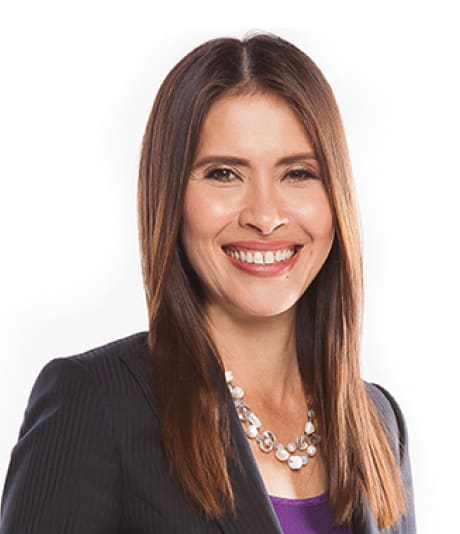Economy, foreign policy are key priorities in first 100 days in office, says Maldives' President-elect Muizzu
The 45-year old will take office on Friday (Nov 17), after beating incumbent President Ibrahim Mohamed Solih in a hotly-contested run-off poll on Sep 30.
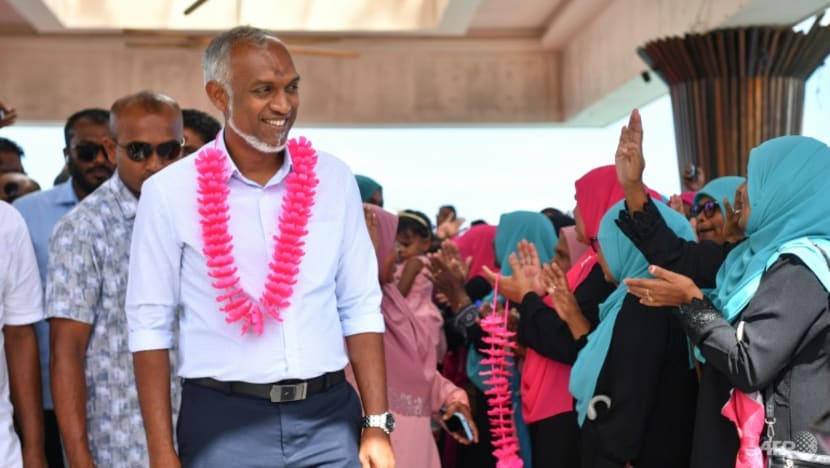

This audio is generated by an AI tool.
Dealing with pressing economic challenges, including ballooning foreign debt, and rebalancing foreign relations amid the India-China rivalry, will be among the key priorities of incoming Maldives President Mohamed Muizzu in his first 100 days in office.
The 45-year old will take office on Friday (Nov 17), after beating incumbent President Ibrahim Mohamed Solih in a hotly-contested run-off poll on Sep 30.
“The people of the Maldives have decided on a change, a progressive change to the way they would like to see the Maldives going forward,” Dr Muizzu told CNA.
GRAPPLING WITH DOMESTIC, EXTERNAL CHALLENGES
The former mayor of the capital Male takes on a nation grappling with domestic and external challenges.
Tourism is the jewel of its economy, contributing more than 28 per cent of its gross domestic product.
However, the incoming president inherits an economy in need of wider reforms.
These include improving the capacity of its ports strategically located in the Indian Ocean, and completing a major expansion of its international airport to meet rising passenger demand.
When he takes office, Dr Muizzu will also be tasked to tame the country’s growing debt. By 2026, the Maldivian economy will have to service a record US$1.07 billion in external debt.
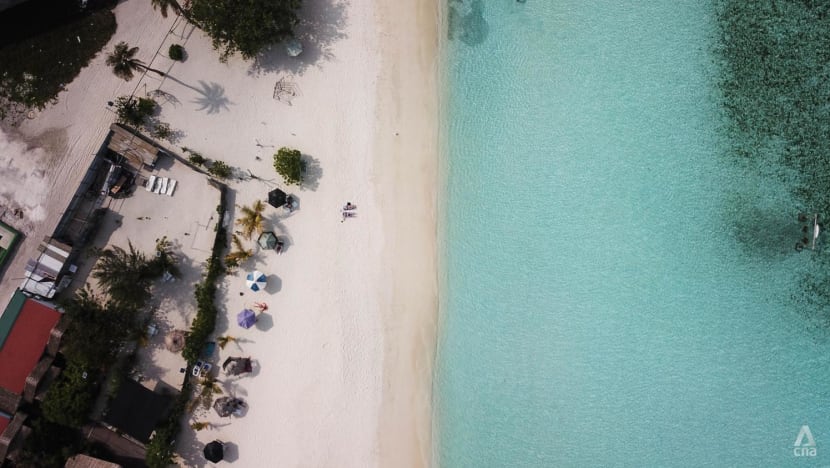
“Our economy is not in a good shape, so one of the key priorities for me during the first 100 days will be to attend to that major issue,” he said.
“We also have some serious issues regarding the way our foreign policy is being outlined (and) managed at the moment, so I will be attending to that issue as well. And also to engage the youth and the women in nation-building, involving them and giving them the opportunity, (and) to empower them, especially in driving our economy.”
TRUST IN GOVERNMENT NEEDS TO BE REBUILT
During his election campaign, there was a sense of disengagement between the government and the people, said Dr Muizzu, adding that Maldivians want a government that works for them and takes care of their needs.
He highlighted how the value of trust for political office holders in a young democracy like Maldives is crucial.
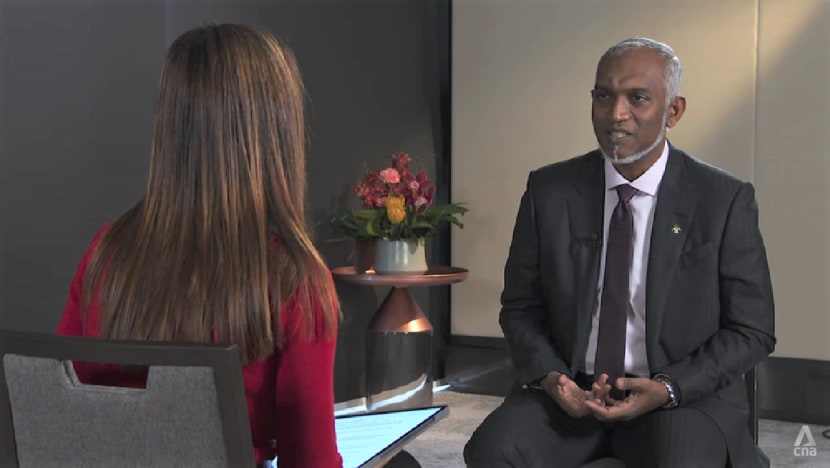
“During the campaign, I found that the undecided voters - those who don't belong to any political parties, those who sit back and they want to see meaningful change happening - there was so much distrust between them and the way the politicians were handling the issues,” said Dr Muizzu.
“The government goes on a separate path, they don't engage or think about how the citizens of these islands want them to be looked after.”
When he visited the islands, he saw that ongoing development projects were not being addressed the way that Maldivians wanted.
“They lost the trust, they said (they) are not being heard, (and they) are not being involved...” he said.
TACKLING CORRUPTION VITAL FOR DEMOCRACY TO SHINE
One of the priorities of Dr Muizzu’s administration is to tackle corruption, with an independent anti-corruption commission to ensure zero tolerance for such practices.
“I will make sure that it is practically entrenched too, because for the government to gain the trust of the people is vital. And even for a democracy to shine, it is very important that we put our maximum (effort into making) the government clean,” he said.
“The way we go about with our business of running the government should be very transparent.”
Transparency on how big projects are being awarded and how they are carried out is important, he said.
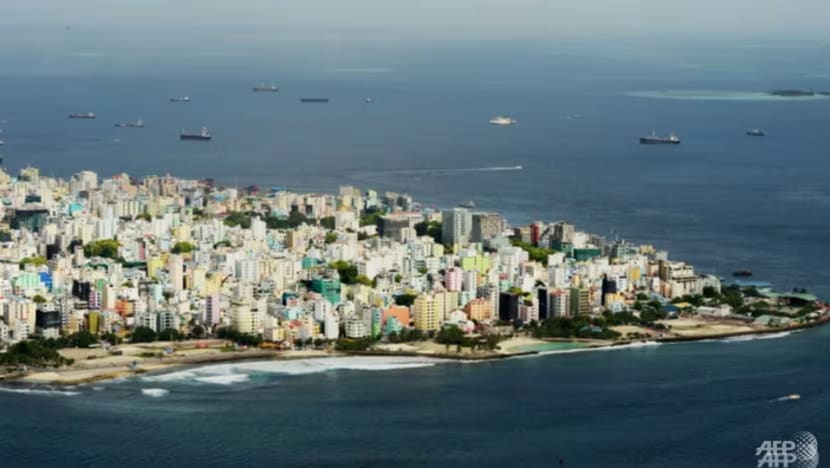
“This is where trust is lost. We hear about big projects and so on being awarded, and nobody knows how it's being done,” said Dr Muizzu, adding that public spending has to bring about positive changes in the lives of the people.
MORE ACTIVE ROLE IN INDO-PACIFIC SECURITY
Maldives, the smallest country in Asia, wants a more active role in Indo-Pacific security and regional maritime discussions, said Dr Muizzu, who is seen by political watchers as pro-China.
This comes as his election victory has put the nation’s foreign policy balancing act between China and India in the global spotlight.
One of his campaign promises rested heavily on a so-called “India Out” campaign, a call for India to get its military troops out of the country.
Despite that promise, Dr Muizzu told CNA that India will continue to be a “close friend” of the Maldives.
“We will have a close relationship… We have close ties, historical ties between the two countries. India is our closest neighbour,” he said, adding that the number of Indian military personnel in the Maldives is unclear.
“The people of Maldives have very clearly spoken during this campaign, that they have given me a mandate of removing foreign military presence from the Maldives. Whether it's India or any other country, it doesn't matter to us.”
Dr Muizzu, who has been engaging with the Indian government, said the removal of foreign troops is a matter of national security, but noted that Maldives still needs foreign assistance to strengthen its military.
AVOID ENTANGLEMENT IN GEOPOLITICAL FIGHTS
Maldives will maintain good and close relations with all countries, whether they are small or big, he stressed.
“I am definitely very keen on making sure that the Maldives gets the maximum benefit out of this. I'm pro-Maldives, I believe that we are too small a nation to be entangled in this so-called geopolitical fight between bigger nations,” said Dr Muizzu.
“(Geographically, we) stand almost in the middle of Africa and Southeast Asia, and all the sea lines of communication go through or near the Maldives. And for us, as well as other bigger countries, it is very important that this remains safe.”
Maldives needs the assistance of all countries to support its defence, and not just any one power, said Dr Muizzu, adding that bilateral relations are built on mutual trust and respect.
Related:
CLEAR POSITION ON ISRAEL-HAMAS CONFLICT
The predominantly Muslim nation has supported the recent United Nations (UN) General Assembly resolution calling for a ceasefire in Gaza, amid the ongoing Israel-Hamas war.
On the country’s position on the conflict, Dr Muizzu said its stand is “very clear”.
“From day one, we are firmly with the people of Palestine in getting their rights, just like any citizen of the world, the right to live peacefully, to live a peaceful life, to get their right of a state,” he added.
“I don't want any killing of innocent men, women or children from any side. It shouldn't happen, but the right to fight for independence within international norms (and) international standards is something that is protected, as well as the right to have a peaceful state.”
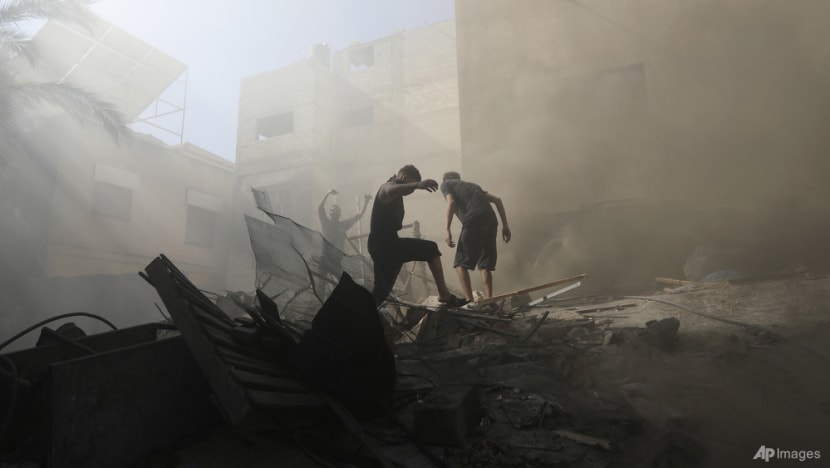
He shared his concerns over anti-Muslim sentiments whenever such conflicts escalate, adding that it is unfair for Islam to be targetted.
“It shouldn't happen, and Islam is a peaceful religion. There may be extremists in different parts of the world, in any religion. These people don't represent the religion, they have extreme ideas, and this should be tackled globally as a separate issue,” said Dr Muizzu.
“We from the Maldives always help in tackling terrorism and extremism, and so it should not be tied with this conflict, which is a genuine call for a peaceful state for Palestine.”
SMALL COUNTRIES NOT GETTING ENOUGH HELP TO ADAPT TO CLIMATE CHANGE
Meanwhile, Maldives has to tackle another global problem that is climate change.
It is among the countries most vulnerable to global warming, so much so that 80 per cent of the archipelago could be uninhabitable by 2050.
Maldives will need “lots of assistance technically, technology-wise, definitely financially” to adapt and mitigate climate change issues, said Dr Muizzu.
The island nation’s marine biodiversity is already feeling the heat.
Rising sea levels have jeopardised access to fresh water, while increasing ocean temperatures have directly impacted its rich marine biodiversity.
Around 70 per cent of the country’s corals were damaged in the severe global bleaching event in 2016.
Dr Muizzu hopes the upcoming COP28, the annual UN climate change conference, in Dubai will push more countries to see the urgency of climate change issues.
“This inaction speaks louder than words. I hope that inaction changes to action starting from COP28,” he said.
“We can see, for instance, severe bleaching of corals across coastal countries. Every coral that's bleached needs to be paid by those countries that emit CO2 (carbon dioxide). The emitters of the world need to pay for this damage that's happening to the Maldives.
“So every coral that's bleached, every piece of land that's contaminated, every fish that dies because of this climate change should be properly addressed. And that's not the way it's going so far.”








